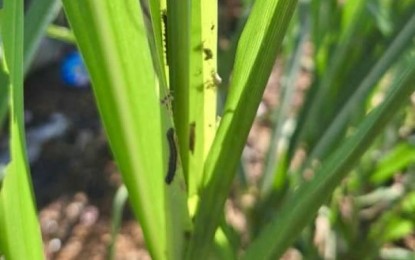
INFESTATION. An armyworm infestation on a sugarcane plant in Sitio Iling-iling, Barangay Cabadiangan, Himamaylan City as seen in this photo taken on Wednesday (June 19, 2024). Some local governments in Negros Occidental have teamed-up with the private sector to help address army worm infestation in corn and sugarcane fields in their areas. (Photo from Atty. Dino Facebook page)
BACOLOD CITY – Both the government and the private sector have taken measures to address the infestation of armyworm in corn and sugarcane fields in at least four local government units (LGUs) in the fifth district of Negros Occidental.
Affected areas include some villages in Isabela, Binalbagan and Moises Padilla as well as Himamaylan City.
Negros Occidental 5th District Rep. Emilio Bernardino Yulo, who monitors the extent of the damage, said he has reported the infestation to the Department of Agriculture (DA) and the Office of the Provincial Agriculturist (OPA).
On Thursday, together with personnel from the Sugar Regulatory Administration (SRA), Yulo observed a demonstration on chemical control of the infestation in Sitio Iling-iling, Barangay Cabadiangan, Himamaylan City.
“Majority of those affected are sugarcane, although there are also cornfields that were affected. We want to prevent the infestation from further spreading and also from recurring,” Yulo said in an interview.
An infestation was reported in cornfields at Barangay Santol, Binalbagan and in Barangay Quintin Remo, Moises Padilla, he added.
OPA head Dina Genzola said their personnel are conducting an assessment and validation of the armyworm infestation in coordination with the affected local government units.
According to the DA, armyworms are destructive pest named after their army-like movement in agricultural fields and would usually consume turf grass, but would eat any vegetation in their path.
They can be controlled using neem oil-based sprays or with biological controls like earwigs, spiders, and predatory wasps.
Prolonged drought followed by heavy rains are seen to sustain the development of armyworms, various studies showed.(PNA)
 The Philippine News Agency is a web-based newswire service of the Philippine government under the supervision of the News and Information Bureau (NIB) of the Presidential Communications Office (PCO).
The Philippine News Agency is a web-based newswire service of the Philippine government under the supervision of the News and Information Bureau (NIB) of the Presidential Communications Office (PCO).